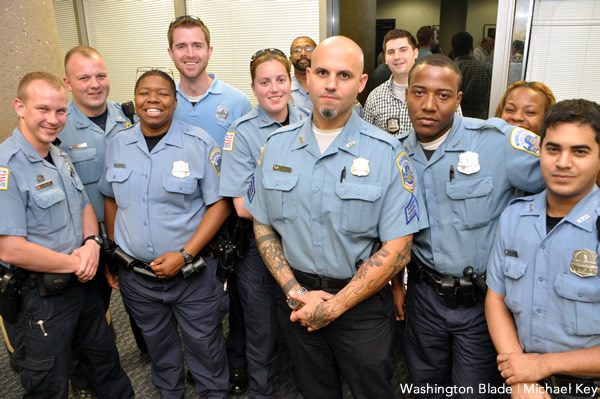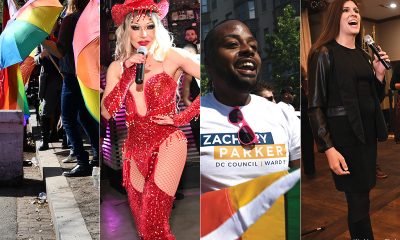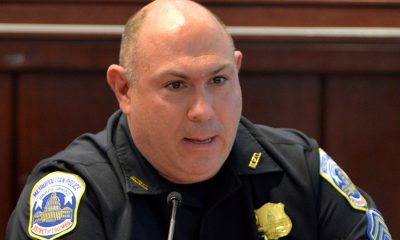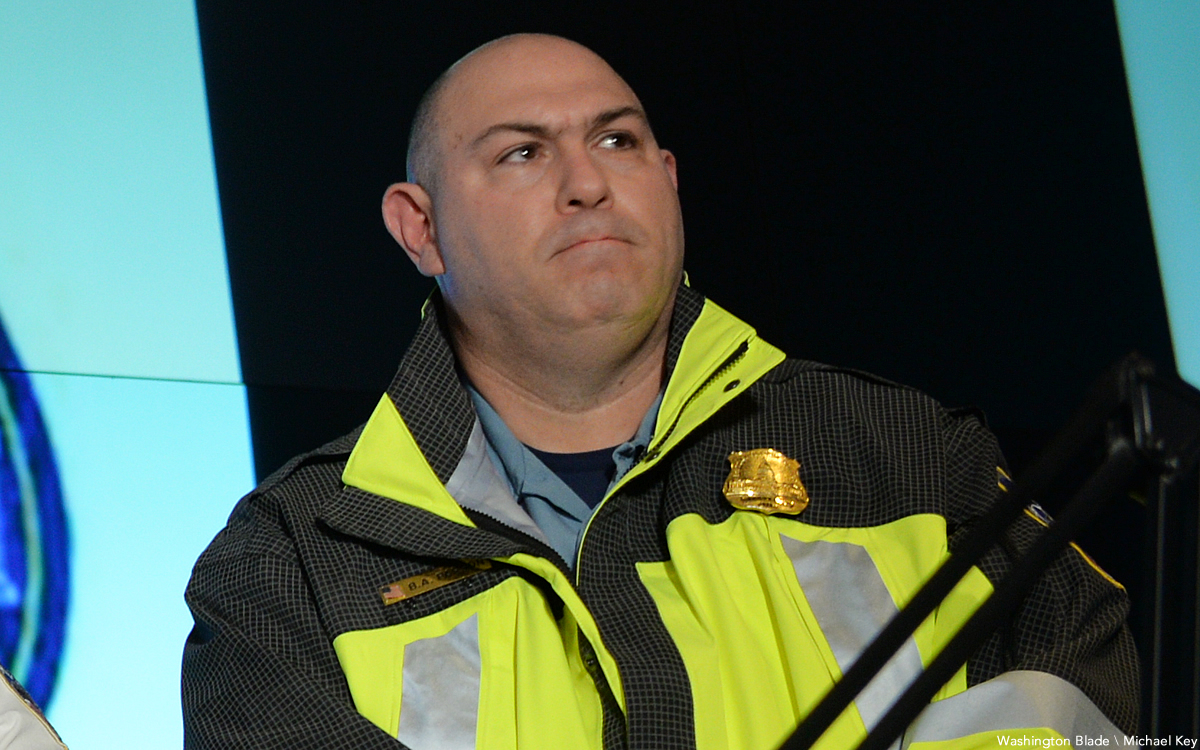Local
UPDATE: GLLU gets temporary new sergeant
Mahl ‘rotating through as part of his training’

A sergeant from the D.C. Police Department’s Sixth District began work on July 1 as supervisor of the department’s Gay and Lesbian Liaison Unit as part of a three-month training program and will return to the Sixth District upon completion of the program, according to a police spokesperson.
Earlier reports from police sources, now said to be incorrect, indicated that Sgt. Matthew Mahl would become the new permanent supervisor of the GLLU, marking the first time the unit has had a full-time supervisor assigned exclusively to the unit since 2009.
“Sergeant Mahl is an affiliate member [of the GLLU] and he is rotating through as part of his training,” Police Chief Cathy Lanier said on Friday in an email to gay activist Peter Rosenstein.
In a separate email, police spokesperson Gwendolyn Crump told the Blade, “Sgt. Mahl is an affiliate and like every member who attends affiliate training, he is rotating through and will return to his assigned element at the end of his detail.”
Lanier told the Blade in an interview last week that GLLU affiliate members are detailed to the GLLU headquarters in Dupont Circle for a 90-day training period before being rotated back to their regular assignment in one of the department’s seven districts.
Some local LGBT activists have urged Lanier to appoint a full-time sergeant to head the GLLU instead of retaining the unit’s current status of being headed by a sergeant who divides his duties between the GLLU and the department’s Latino Liaison Unit.
Since 2009, Sgt. Carlos Mejia has served as supervisor of both the GLLU and the Latino Liaison Unit. He has been praised by LGBT activists who say he has been doing an excellent job.
But the activists, including leaders of the local group Gays and Lesbian Opposing Violence (GLOV), have said the liaison units would be better served – as they had in past years – with a full-time sergeant assigned exclusively to each of the units, including the GLLU.
“I’m glad that Sgt. Mahl is rotating through the GLLU for training but we are still hoping that previous commitments from the chief and the mayor will secure a fulltime permanent sergeant for the unit,” Rosenstein said on Friday.
In her email to the Blade, Crump said Mejia and Sgt. Kenny Temsupasiri are permanently assigned to the Special Liaison Division, which oversees the GLLU, the Latino Liaison Unit and two other special units — the Asian Liaison Unit and the Deaf and Hard of Hearing Liaison Unit.
Temsupasiri heads both the Asian and Deaf and Hard of Hearing Units.
Mahl told the Blade on Thursday that during his tenure at the Special Liaison Division he would serve as full-time supervisor of the GLLU and Mejia would serve exclusively as the Latino Liaison Unit’s supervisor.
“He’s helping me out getting things settled down here,” Mahl said of Mejia.
Capt. Edward Delgado, who heads the Special Liaison Division, sent an email on Thursday to LGBT advocates and various LGBT organizations announcing Mahl’s assignment at the GLLU.
“I would like for each of you to introduce yourself and inform him of the services that each of your organizations provide the community,” Delgado said in his email. “I know that he has been out in the community conducting meet and greet sessions. Therefore, let’s give Sgt. Mahl a warm welcome and support him while he is detailed to the Special Liaison Division,” he said.
Mahl said he has been on the police force for eight and a half years. He began as an officer assigned to the Third District and was assigned to the Sixth District shortly after being promoted to sergeant in 2009.
He said he’s looking forward to working with the LGBT community during his tenure as a GLLU supervisor.
Original post below:
A sergeant from the D.C. Police Department’s Sixth District has been named supervisor of the department’s Gay and Lesbian Liaison Unit, marking the first time the unit has had a full-time supervisor assigned exclusively to the unit since 2009.
Sgt. Matthew Mahl has replaced Sgt. Carlos Mejia, who had been serving as supervisor of both the GLLU and the Latino Liaison Unit.
LGBT activists, while praising Mejia for his work at the GLLU, have long called on police officials to name a sergeant to head the GLLU who spends all of his or her time assigned to the unit.
But the head of the police division that oversees the GLLU and three other special police liaison units, Capt. Edward Delgado, suggested in an email sent to LGBT activists on Thursday that Mahl’s assignment with the GLLU could be short-lived.
“I would like to welcome Sergeant Matthew Mahl who is an Affiliate Sergeant from the Sixth District,” Delgado said in his email. “He is detailed to the unit to get a better understanding of GLLU operations and requirements…Therefore, let’s give Sergeant Mahl a warm welcome and support him while he is detailed to the Special Liaison Division.”
A police spokesperson couldn’t immediately be reached to determine whether Mahl’s tenure at the GLLU is consider permanent or temporary.
The Special Liaison Division oversees the GLLU as well as the Latino Liaison Unit, the Asian and Pacific Islander Liaison Unit, and the Deaf and Hard of Hearing Liaison Unit.
Mahl said Mejia, who is helping him “get on the ground running” at the GLLU, will remain as head of the Latino Liaison Unit.
“The plan is for him to just take over full time the Latino Liaison and myself the Gay and Lesbian Liaison,” Mahl told the Blade on Thursday. “He’s helping me out getting things settled down here.”
Former D.C. Police Chief Charles Ramsey created the GLLU in the late 1990s as one of the first such units in a large metropolitan police department to be given full authority to make arrests and investigate crimes as well as reach out to the LGBT community.
Current D.C. Police Chief Cathy Lanier expanded the GLLU and the other three liaison units over the past four years to include dozens of affiliate officers assigned to each of the department’s seven police districts.
The GLLU affiliate officers, who receive training on LGBT related issues, respond to calls in their respective districts on matters such as anti-LGBT hate crimes or LGBT related domestic violence.
The GLLU’s headquarters in Dupont Circle currently includes five full-time “core” officers along with Mahl as supervisor. An aide to Lanier said last week that there are currently 99 GLLU affiliate officers based in the seven police districts.
Sgt. Brett Parson served as full-time supervisor of the GLLU from 2001 to 2007, receiving praise from LGBT activists for having a highly visible presence in the community. Parson served as head of the then Special Liaison Office, which oversaw the GLLU and the other three liaison units, between 2007 and 2009.
In 2009 Parson also took on the role of GLLU head after his replacement, Sgt. Tania Bell, left the unit. Later that year Parson requested a transfer to a street patrol position, saying his first love as a cop was to focus more on active crime-fighting duties. It was at that time that Lanier assigned Mejia to serve as supervisor of the GLLU while retaining his existing post as supervisor of the Latino Liaison Unit.
Lanier said that due to city budget cuts and police spending constraints, it became necessary to assign Mejia to take on the dual role of supervisor of both units.
The two other special liaison units – the Asian Pacific Islander Liaison Unit and the Deaf and Hard of Hearing Liaison Unit – retained a full-time sergeant serving as supervisor.
Mahl said he was approached about taking on the role as head of the GLLU by Deputy Police Chief Diane Groomes and Delgado.
He said he has been on the force for eight and a half years. He said he began as an officer in the Third District and was promoted to sergeant in 2009 before being assigned to the Sixth District. Mahl said he looks forward to his duties with the GLLU and will be meeting with LGBT advocates and various LGBT organizations over the next few weeks.
“I don’t know how long these things last, but I’m here for now,” he said, when asked whether he was told how long his detail with the GLLU would last.
As of Thursday, the department had not issued an official announcement of Mahl’s assignment to the GLLU.
A.J. Singletary, chair of Gays and Lesbians Opposing Violence (GLOV), which monitors police related issues, said he was unaware of Mahl’s assignment as GLLU head until the Blade contacted him about the development.
“I think it’s great,” he said. “Having someone talking on this role is something we have been asking for and the community has been asking for. GLOV has always called for having a full-time sergeant.”
District of Columbia
D.C. Black Pride theme, performers announced at ‘Speakeasy’
Durand Bernarr to headline 2026 programming

The Center for Black Equity held its 2026 DC Black Pride Theme Reveal event at Union Stage on Monday. The evening, a “Speakeasy Happy Hour,” was hosted by Anthony Oakes and featured performances by Lolita Leopard and Keith Angelo. The Center for Black Equity organizes DC Black Pride.
Kenya Hutton, Center for Black Equity president and CEO, spoke following the performances by Leopard and Angelo. Hutton announced this year’s theme for DC Black Pride: “New Black Renaissance.”
Performers for 2026 DC Black Pride were announced to be Bang Garcon, Be Steadwell, Jay Columbus, Bennu Byrd, Rue Pratt and Akeem Woods.
Singer-songwriter Durand Bernarr was announced as the headliner for the 2026 festivities. Bernerr gave brief remarks through a video played on the screen at the stage.
DC Black Pride is scheduled for May 22-25. For more information on DC Black Pride, visit dcblackpride.org.
Virginia
Arlington LGBTQ bar Freddie’s celebrates 25th anniversary
Owner asks public to support D.C.-area gay bars

An overflowing crowd turned out Sunday night, March 1, for the 25th anniversary celebration of Freddie’s Beach Bar, the LGBTQ bar and restaurant located in the Crystal City section of Arlington, Va.
The celebration began as longtime patrons sitting at tables and at the bar ordered drinks, snacks, and full meals as several of Freddie’s well-known drag queens performed on a decorated stage.
Roland Watkins, an official with Equality NoVa, an LGBTQ advocacy organization based in the Northern Virginia areas of Arlington, Alexandria, and Fairfax County, next told the gathering about the history of Freddie’s Beach Bar and the role he said that owner Freddie Lutz has played in broadening the bar’s role into a community gathering place.
“Twenty-five years ago, opening a gay bar in Arlington was not a given,” Watkins told the crowd from the stage. “It took courage, convincing, and a deep belief that our community belongs openly, visibly, and proudly,” he said. “And that belief came from Freddie.”
Watkins and others familiar with Freddie’s noted that under Lutz’s leadership and support from his staff, Freddie’s provided support and a gathering place for LGBTQ organizations and a place where Virginia elected officials, and candidates running for public office, came to express their support for the LGBTQ community.
“Over the past 25 years, Freddie’s has become more than a bar,” Watkins said. “It has become a community maker.”
Lutz, who spoke next, said he was moved by the outpouring of support from long-time customers. “Thank you all so much for coming tonight and thank you all so much for your support over the past 25 years,” he said. “I can’t tell you how much that means to me and how much it’s kept me going.”
But Lutz then said Freddie’s, like many other D.C. area gay bars, continues to face economic hard times that he said began during the COVID pandemic. He noted that fewer customers are coming to Freddie’s in recent years, with a significant drop in patronage for his once lucrative weekend buffet brunches.
“So, I don’t want to be the daddy downer on my 25-year anniversary,” he said. “But this was actually the worst year we’ve ever had,” he added. “And I guess what I’m asking is please help us out. Not just me, but all the gay bars in the area.” He added, “I’m reaching out and I’m appealing to you not to forget the gay bars.”
Lutz received loud, prolonged applause, with many customers hugging him as he walked off the stage.

In an official statement released at the reveal event Capital Pride Alliance described its just announced 2026 Pride theme of “Exist, Resist, Have the Audacity” as a “bold declaration affirming the presence, resilience, and courage of LGBTQ+ people around the world.”
The statement adds, “Grounded in the undeniable truth that our existence is not up for debate, this year’s theme calls on the community to live loudly and proudly, stand firm against injustice and erasure, and embody the collective strength that has always defined the LGBTQ+ community.”
In a reference to the impact of the hostile political climate, the statement says, “In a time when LGBTQ+ rights and history continue to face challenges, especially in our Nation’s Capital, where policy and public discourse shape the future of our country, together, we must ensure that our voices are visible, heard, and unapologetically centered.”
The statement also quotes Capital Pride Alliance CEO and President Ryan Bos’s message at the Reveal event: “This year’s theme is both a declaration and a demand,” Bos said. “Exist, Resist, Have Audacity! reflects the resilience of our community and our responsibility to protect the progress we’ve made. As we look toward our nation’s 250th anniversary, we affirm that LGBTQ+ people have always been and always will be part of the United States’s history, and we will continue shaping its future with strength and resolve,” he concluded.
-

 India5 days ago
India5 days agoActivists push for better counting of transgender Indians in 2026 Census
-

 Advice5 days ago
Advice5 days agoDry January has isolated me from my friends
-

 National5 days ago
National5 days agoAfter layoffs at Advocate, parent company acquires ‘Them’ from Conde Nast
-

 District of Columbia5 days ago
District of Columbia5 days agoCapital Pride reveals 2026 theme




















